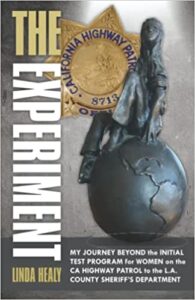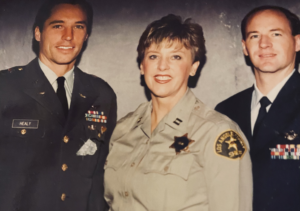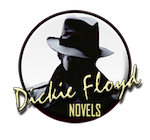Linda Healy was part of a law enforcement experiment: in 1974 the California Highway Patrol held its first academy class that included women. Her book, THE EXPERIMENT, chronicles her rise from a meter maid to being a commander in the Los Angeles County Sheriff’s Department. I am honored to share with you my interview of her:
 D: Linda, so I’ve just finished reading your memoir, THE EXPERIMENT, and I have to say, I have tremendous respect for all you’ve endured, overcome, and accomplished. What inspired you to tell this fascinating story?
D: Linda, so I’ve just finished reading your memoir, THE EXPERIMENT, and I have to say, I have tremendous respect for all you’ve endured, overcome, and accomplished. What inspired you to tell this fascinating story?
L: My endurance was prompted by having two sons and burning bridges at my first police job. I had no other choice but to succeed. I just got up every day and did the best that I could. Plus my sons were expecting me to succeed. I knew that I had experienced over time a life I had never anticipated and I wanted to share it with family.
D: Have you always wanted to write a book?
L: No, I have been told by a number of people that I should, but I was either too lazy or too busy living to sit and write. I signed up for a beginner’s class in writing memoirs. My instructor moved me to a more advanced class. The feedback that I received from my instructor and fellow students drove me to continue.
D: I usually write early in the morning before the day is started, a fresh pot of coffee at the ready. What is your writing routine?
L: I am not so prone to function in a routine. There were days when I spent all day writing only to realize I had not changed out of my pajamas. I grabbed time where I could and became a bit obsessed with writing. It was relaxing and I dealt with some old burning issues from the past.
D: A part of your book that lingers with me is when you learn of the tragic murder of one of your deputies, and while responding to the scene, you happen to get a phone call from one of your sons. You tell him what you have on your plate—no doubt with some emotion—and he simply says, “The captain is a rock.” Your readers will, by that part of the book, get the full meaning of it, the reciprocal support of a tight-knit family unit that has endured much.

L: My sons are both great leaders in their own right. I suspected it when they were young and learned how true it is as they matriculated through the military and now in the world of business. They are both men of few words when it comes to giving advice and they are right on the money as Tim was that night. They are both principled and fair and I hope each will write a book someday.
D: Okay, so I’ll back up. You started out as a meter maid in sleepy San Luis Obispo, and that is where you first endured unwanted advances and subsequent retaliation, by the chief, in that instance. You were a pioneer, a part of the first-ever group of females to be accepted into the CHP academy. At one point, a drill instructor socked you in the stomach. When you went to your first assignment in East Los Angeles, the other officers shunned you, at best. Were there ever times when you questioned your own sanity for the path you had chosen?
L: Oh yes, I questioned my sanity and my decision, but I am not one to linger on the past. It’s illogical because there’s not a damn thing you can do about what is done but make it work. I would like to add that the behavior of people – men during that time – is not offensive or surprising. Coming out of the 50s and 60s, it was unthinkable for women to aspire to certain roles. The time and the norms must always be considered when one judges the past.
D: After a couple of years with the CHP you became a deputy sheriff, successfully completing yet another difficult academy, and then you went on to work an array of assignments as you were also promoted through the ranks. I found it interesting that you were always drawn back to patrol, that it was there you felt the most connected. What was it about working at and commanding patrol stations did you enjoy the most?
L: That is an easy question. It was the people, the people, and the people. When I was in a position to supervise, even those whom I considered problem deputies, and there were always a few, deserved my best effort. They all do a difficult job that relies on instantaneous decision making. We rush to those places where others flee. We could make mistakes in the heat of the moment that could end a career. My heart is attracted to those who are brave enough to take a risk and willing to bear the consequences. There are heroics in that willingness, knowing that you will be judged. I have seen so many compassionate acts on the part of police officers who do not seek credit or accolades for those acts. I have also seen them become angry, frustrated, or disgusted, and bury those feelings to their own potential harm. I just love those who do this job, and I want them to do it well.
D: If I had it to do over, there are a few things I might have done differently, hindsight having the clarity that it does. What about you, anything you’d change if you did it all over?
L: I would have kept better notes so when I had to answer for things that went wrong, I had documentation that supported my motives. The internal affairs incident was hard on me. It wouldn’t have been had I really not worked my ass off at trying to fix all that was wrong at SBI. I had. But taking the hit for someone else who did not work for me was hard. I spent years after I retired writing my anger down in letters but not sending them. The writing of the book was the way I stopped being angry.
D: I’m very impressed with your book. It is not only a fascinating story but it is told with the expertise of a practiced wordsmith. For instance, I found it brilliant that you hook the reader at the beginning with a deadly confrontation that chronologically takes place much later in your story. Did writing come naturally to you?
L: That technique came from my friend Danny Smith when I read his memoir. I have always liked writing and I write fast but do not pay attention to details. I have to fix what I write from “chain of thought” to eliminate unnecessary words and errors.
D: I also found it remarkable that you raised two terrific young men while navigating a demanding career in law enforcement and trying to strike a balance on the home front. To what would you attribute that success?
L: I get asked that a lot. I have said because I not only loved my sons, I liked them. They were fun and smart and energetic. They also had to do more than kids with two parents in the home. They learned to be self-sufficient in many ways. Their dad loved them also and the kids did not experience us pulling at them to discredit each other. We supported each other when it came to the boys. It is still true today with our grandkids. Their dad is a good man and he is married to a good woman. I was more dedicated to my boys than to any man and that does not make a good relationship. The other quality that I felt toward them was trust. I trusted them to do the right thing. I have found out since they are much older that they did their share of mischievous acts. I’m rather glad I didn’t know about them at the time. We had fun together and I did not think I had to continually nag them to be perfect. I just wanted them to clean their room. However, the military was much better at getting that point across.
D: Were there any stories you held out, something you had written and, for whatever reason, cut from the original manuscript?
L: Yes, actually, there are several. It’s funny how the memory works, I remembered additional events after I had passed that part of the book. One was a homicide at Altadena. An African American woman was strangled by a phone cord in her home. The perpetrator set fire to the house but it only smoldered. Her nude body was half on the floor and half on the couch, and the ash had settled on her skin making her skin look like black velvet. It was strangely beautiful. The picture has stayed with me to this day.
D: Favorite genres and authors?
L: Authors who can draw a picture: Charles Dickens, Amar Towles, Danny Smith, Delia Owens, Kristin Hannah are a few. I like to read detective/murder stories, history, military. “Where the Crawdads Sing” by Delia Owens is a beautiful story of the strength of a little girl who becomes a successful woman. I like when people find it in themselves to overcome.
D: Many people have compared my writing to that of Elmore Leonard, and he just happens to be one of my all-time favorite authors. Do you think any of your writing is influenced by the authors you most read?
L: Actually, I don’t know. When I began writing I wasn’t very descriptive and my granddaughter, Casey, and grandsons, Robbie and Connor, who are excellent writers, started red penciling my work calling for more descriptions. I was cautioned to maintain my voice, which can be a bit sarcastic at times especially when I talk to myself. I leave it to others to say if I sound like someone else.
D: What’s next for you? Can your many new fans expect another penning from you? (I sure hope so!)
L: My GKs and I have together created a number of children’s books. “The Healy Detective Agency” series. At nighttime, we would make up stories and some of them are very good and funny. The first story for kids I will probably write is “Ghost Kitty.”
D: The floor is yours. Is there anything you’d like my audience to know about you?
L: I learned a lesson from my experience to give life my best. The “I can’t” phrase is a downer. I also would encourage young and older people to continue to plan their lives as many are taught to do. However, don’t ever forget your peripheral vision. What intrigues you off in another direction is worthy of sticking your toe into. You just never know what comes up. Also, society needs to learn to be a little less judgmental. I have traveled a lot in my retirement and found that the way I think life should be is not the same for others. I’ve learned to be a better listener and as such have discovered that I may not, as I thought at one time, know that my way is always the right way. That is a key to good leadership.
There is one other very important thing would like to say. I taught my sons, in the event they were pulled over by a police officer, to place their hands on the steering wheel and respond with a yes sir/ma’am or no sir/ma’am. The anxiety level for police officers when pulling over a perfect stranger and not having any idea what they will encounter is very high anxiety whether they admit it or not. You just never know If this is the moment that you have trained for. The driver’s job is to put the officer at ease by following his directions. The place to lodge your complaint is with his supervisor or in court. It is just plain stupid to challenge someone who is armed and authorized to enforce the law.
D: Thank you, Linda, for the great interview.
Get your copy of THE EXPERIMENT today!
* * *
Thank you for reading my blog. I hope you will share it with your family and friends.

Danny, great interview & appreciate your very appropriate contribution to Women’s History Month! Linda’s book is now on my “must read” list.
Thank you, Valerie!
Terrific Danny! Linda Healy sure was a pioneer, and an awesome police officer. Thank you for this interview regarding her career and her memoir!
Linda Adair
Bluffton SC
Thank you, Linda!
This was an excellent interview. My congratulations on the book and upon completing what was obviously a richly rewarding career in law enforcement. You sound like a good leader. And I thought Danny’s memoir was fabulous as well. I look forward to reading yours. Stay strong.
Thanks, Mike!
Interesting interview. good job as usual
Thank you, Claude.